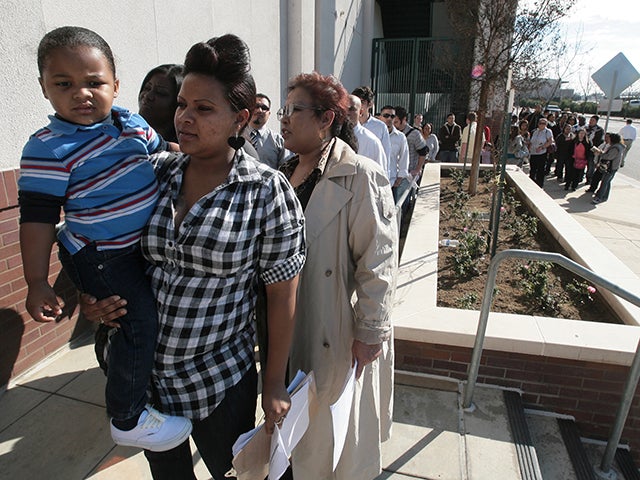Jordan at Policy Summit: Let’s Encourage Work
Ken McIntyre /

Crystal Caballero, who said she needs a job so she can get off welfare, holds her son, 2 1/2-year-old Lah-Johndre (cq) Pardue, as she waits in line outside Chukchansi Park to apply for seasonal work. / © Eric Paul Zamora/The Fresno Bee/ZUMAPRESS.com
Legislation to hold increases in total welfare spending to inflation and to require able-bodied adults on food stamps to get a job or seek one will refocus attention on the dignity of work, Representative Jim Jordan (R-OH) said today. When government policies “disincentivize work,” Jordan said, “we are robbing people of skills, lessons, and principles.”
Administration officials and other defenders of Obamacare stepped over the line in recent days by embracing “this idea that somehow it’s good when people don’t work,” Jordan said in remarks at the all-day Conservative Policy Summit convened at Heritage by its political action arm, Heritage Action for America.
>>> Check Out: DeMint Calls for an ‘Agenda to Unite America’
“Hard work doesn’t guarantee success, but it sure goes a long way,” Jordan said, quoting a high school coach and chemistry teacher who echoed his father on the value of discipline.
“The problem in this town is that we do things the convenient way,” Jordan said at the policy summit, which is streaming from Heritage Action’s website until its conclusion at 6 p.m.
Jordan, who will again sponsor reform legislation, also joined in a panel discussion, moderated by Heritage Action CAO Tim Chapman, featuring Jennifer A. Marshall, Heritage’s director of domestic policy studies, and anti-poverty activist Robert Woodson, head of the Center for Neighborhood Enterprise.
Although we now spend $1 trillion a year in 80 means-tested welfare programs – and have spent $20 trillion in the 50 years since President Johnson launched the War on Poverty in 1964 – government has failed to provide incentives that “will bring out the successes” possible amid the poorest of neighborhoods, Marshall said.
Johnson intended to strike at and root out the causes of poverty, not just the symptoms. “The job is not done,” Marshall said. “We have not done justice to the poor in the United States.”
Woodson talked about strategies to deploy more successful residents of lower-income communities – folks from “the same cultural and geographic zip codes” — to encourage and show others how to improve their lives.
“We spend too much time tasking about the deficits of poor people; we need to inspire them to talk about the victories possible,” Woodson said. “We need to isolate what’s being done right by 30 percent and nurture it in the other 70 percent.”
This story was produced by The Foundry’s news team. Nothing here should be construed as necessarily reflecting the views of The Heritage Foundation.
